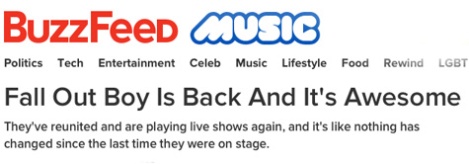My Bloody Valentine, Jeff Magnum and the Musical Recluse in the Age of Nostalgia
Is the era of the musical recluse officially over?
Consider that we now live in a world where:
- Axl’s Guns ‘n’ Roses actually finished Chinese Democracy
- Jeff Mangum (Neutral Milk Hotel) emerged from more than 12 years of hiding and now tours regularly.
- David Bowie is releasing new music after most in the industry had believed him to be officially retired.
- My Bloody Valentine finally completed a follow-up album to its 1991 masterpiece Loveless.
With the possible exception of Chinese Democracy — that thing was bound to find its way out to the world one way or another — all of these were genuinely surprises. The most recent of the bunch, My Bloody Valentine’s new album mbv (self-released last Saturday), was a project that many people still didn’t quite believe was really happening, even as it gained an aura of actuality the past few months. The band’s leader, Kevin Shields, had been down this road before, only to abandon projects near the finish line.
Well, he made it, and now it seems that with the exception of a Smiths reunion and Dre’s Detox, anything is possible when it comes to resolving long-standing musical absences. It’s come to the point where short-lived breakups or hiatuses — like Death From Above 1979, the Postal Service or Fall Out Boy — are inevitably resolved, and where I wouldn’t blink an eye at a Coachella headlined by LCD Soundsystem and the White Stripes by 2017.
I do miss the mystery, but there’s little question that the recluse seems increasingly out-of-place in modern music culture. When it comes to performers and artists, we long ago traded a persona of absence for a persona of presence. The information and emotion gaps we once filled with our own imagination are now filled with more information and more emotions. They’re fed, in many cases, directly from artist to fan through social media, and they’re enabled and supported by a digital hit-count culture that can transform any out-of-context quote or tiny insight into a “breaking news” article.
In the case of Mangum and MBV, returning to the spotlight also threatens a key part of their romantic appeal: the masterpiece album so great that it simply couldn’t be followed. Loveless and In the Aeroplane Over the Sea are two of the most influential albums of the 1990s, and unlike many notable albums from that era, seem decidedly out-of-time and separated from contemporary sounds or trends. As a fan and an appreciator, I’m clearly in the chorus celebrating their greatness, but I’d argue that neither album would be nearly as acclaimed and beloved had they received quick and efficient follow-ups.
So why come out of hiding? The less cynical argument is that an artist needs to make art, and an entertainer needs to entertain. You can hardly blame an artistic-minded individual for wanting to create something new at some point, and if you’re the type who also wants to connect with an audience, it makes sense to make your art in the style and format that your audience is most likely to engage with.
The cynical argument is, of course, money. With the United States having finally developed a thriving festival circuit, it suddenly makes a lot more sense to put together a small reunion tour and reap the profits. I’ve spoken to industry types with some knowledge of the money being thrown around for even a minor reunion like DFA1979 and let me tell you: it’s more than enough to make someone think twice about maintaining a mystique.
Edit: On Facebook, my friend John made another excellent point: that certain artists who have become more famous in absence never got the opportunity to make much money in their actual time. Nostalgia culture gives them ability to finally earn a proper payday, which, hey, fair enough.
This gets us to the real question: why is there such an appetite among music fans for revisiting the not-too-distant past in the first place?
mbv has a rather compelling way of handling the nostalgia question. At the album’s start, it openly embraces it, delivering a suite of songs that uses Loveless as a foundation to such an extent that it’s as if it presumes the listener is intuitively aware of the homage, a sort of intertextual soundtracking. It sounds not unlike a My Bloody Valentine tribute band writing three great My Bloody Valentine-inspired songs to pad out its set.
Yet as the album moves along, it gets weirder, more eclectic, before its final track, “wonder 2,” brings the record to a flanger-soaring close in a haze of distortion and noise. The album uses nostalgia to draw you in, then takes you where it actually wants to end up.
Mangum, in contrast, has shown no pretense of delivering anything more than a nostalgia experience for his fans: with no new material, the only moments of his concerts that resonate with any creative force are when his voice, still miraculous, delivers a sustained hold or impassioned run and you feel the tinge of live and present creation. The rest is all about musical memory.
But his shows aren’t cynical in the slightest. If anything, Mangum’s commitment to hiding behind his songs and encouraging the audience to loudly sing along with him shows an astute awareness of what he’s doing: building a collective experience around the shared emotional connection people have with his music.
Both cases are examples as to how, and why, engaging with a romanticized or emotionally fulfilling past is not inherently a bad thing. Think about your favourite concerts, and how much of the show was built around older material. (Hell, some bands like AC/DC regularly tour with literally one token new song in their set.) Of course we have deeper relationships with songs, albums and artists that have been in our lives for a longer period of time: they’ve been through time’s vetting process, proven their worth to us across multiple stages in our lives, and represent more reliable, valued connections.
This is why the economics of nostalgia make so much sense. For one thing, just like how keeping a customer is cheaper than finding a new one, it’s more affordable to sell an artist an existing fan than to a new one. The tangible elements of that relationships — songs, videos, TV specials, interviews — can be endlessly packaged and repackaged into new arrangements that hit the same satisfying emotional touchpoints. Also, there’s a reason why they’re called our “formative” years: as kids, teens and young adults, we’re more available to try new experiences and arguably more susceptible to marketing and social pressures. It makes more sense to form cultural relationships with the young, and leverage them again as they age, than to provide compellingly new emotional experiences throughout an individual’s life.
There is, of course, another benefit to a nostalgia culture economy: the chance to sell younger audiences on an experience that they missed out on. I’ve witnessed this both as a participant (reunion shows for bands like Pavement and Guided by Voices) and an observer (seeing DFA1979 in the fall with a crowd four times as large and a good five-to-eight years younger than those of us who were there in 2005.) Nearly every generation in the age of mass production — perhaps the baby boom greatest of all — has been able to convince its successors that it missed out on something great, and that they need to invest in experiences that allow them to play cultural catchup.
In all of these cases, the past is selective, amplified by personal experiences that have been rewritten several times over in the mind and heart to fit an emotional narrative. As you might expect, I have mixed feelings about that, but I’m not dogmatic about it one way or another. It just is.
What does concern me is the degree to which our fetishizing of the past overwhelms the present. (Maura Johnston wrote a great piece about this 90s nostalgia recently in Seattle Weekly.) There’s a paradox at the centre of the digital age: a desire for sensation that collides against the knowledge that there is more than enough content out there to sustain ourselves, in terms of entertainment, from now until the end of time. Rather than fetishizing the “new,” this culture fetishizes the “new to you.”
Call it “Buzzfeed culture.”
I have a lot of respect for Matthew Perpetua, who took over as Buzzfeed’s music editor last year, and I’ve been impressed by the writing he and his team have occasionally brought to the site. But when I clicked on what I expected to be a written recap of Fall Out Boy’s NYC return, and found instead a set of photographs — new pictures mixed with old stock photos in a list format — I felt like I’d been duped. In hindsight, I shouldn’t have been surprised: how does one really expect insightful currency to compete with the recycling of the familiar into something semi-new? (90s list after 90s list after 90s list.) Even Stereogum, arguably the most important music blog of the past decade, has fallen into the nostalgia game, running countless “So-and-so’s albums ranked” or “Album XXXXX turns 20.”
And I read most of them.
Because the past they’re describing is my past and I’m genuinely interested in what others have to say about it. I feel that tinge of satisfaction when I’m reminded of something that I loved, and the reason why I loved (or still love) it. My greatest worry in all of this is that, as I enter my fourth decade on earth, I feel my world shrinking. My cultural curiosity is still there, but waning. My willingness to return to the same records over and over — something I’ve always resisted — is growing with a vengeance. And the familiar increasingly feels so much more enticing than taking a chance on something new.
I’ve read more than a few comments from listeners who were scared to start listening to mbv Saturday night because they were worried it wouldn’t live up to expectations. Me, I didn’t worry until — a little bit drunk in a dark Boston hotel room — the first notes kicked in and I felt my heart swoon a little.
And I didn’t know if I could trust it.
From McNutt Against the Music. Follow McNutt on Twitter.
Subscribe to Maisonneuve today.
Related on maisonneuve.org:
—Arcade Fire, Tune-Yards and Growing Up
—9/11, New York Music and Cultural Memory
—Taylor Swift, Carly Rae Jepsen and the Problem of Assessing Pop Music








